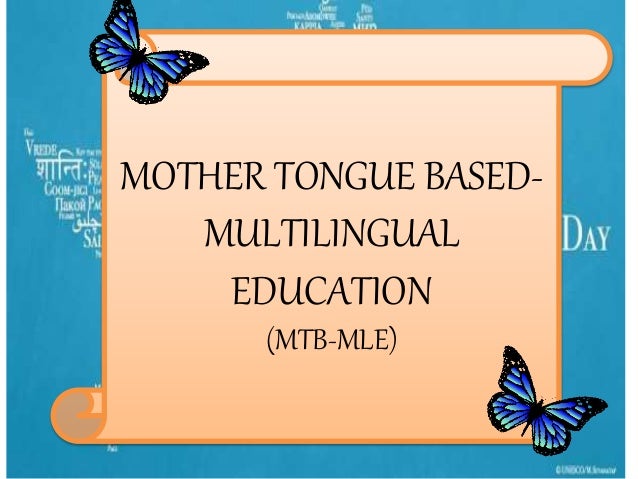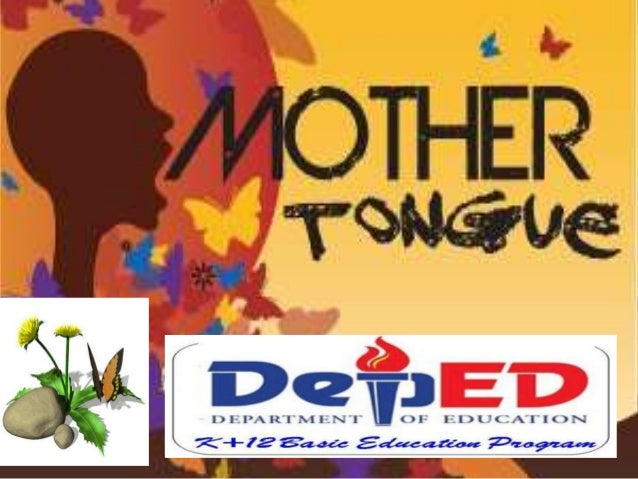- Mother Tongue Based Multilingual Education Deped
- Mother Tongue Based Multilingual Education Articles
- Mother Tongue Based Multilingual Education Meaning
- Concept Based Learning Activities Nursing
Through a Broad-Based Capacity Development (BBCD) initiative, MEC will implement an additional five partnership agreements, in order to bring international expertise in mother tongue to ethnic groups in Myanmar and provide capacity development for Mother Tongue-Based Multilingual Education (MTB-MLE).

The importance of mother tongue language in education
A consequence of the ever-increasing popularity of international schools is the growth in the number of children learning in a language other than their first. This can open opportunities for the individual but, as Carolyn Savage explains, continuing to develop the mother tongue is vital to enhance learning.
Mother tongue-based Multilingual Education UNESCO promotes mother tongue-based bilingual or multilingual approaches in education - an important factor for inclusion and quality in education. Research shows this has a positive impact on learning and learning outcomes. Mother Tongue based Multilingual Education (MT- MLE) is a form of multilingual education built on the learners' mother tongue. This article explores the teachers' ideology on the policy (as policy appropriator). Mother Tongue Based Multilingual Education has been encouraged by United Nations Educational, Scientific, and Cultural Organization (UNESCO) to early childhood and primary education since 1953.Mother Tongue Based Bilingual or Multilingual Education is a program used since 1953 by different countries around the world like Indonesia, Cambodia, Nepal. Discussions relating to MT-Based MLE in Asia tend to use the term in one of two ways. In some contexts, MT-based MLE refers to the use of students’ mother tongue and two or more additional languages as Languages of Instruction (LoI) in school. In other contexts, the term is used to describe bilingual education across multiple language communities—each community using their own mother.
Importance of first language
We are living in a time of unprecedented travel, with technological advances and globalization offering more and more people the opportunity to explore and live in cultures that are not their own. International schools have been established for decades now and are rapidly growing in popularity, particularly amongst local populations, as they offer easier access to higher education opportunities around the world. As a consequence, the number of children learning in a language other than their mother tongue is growing rapidly.
Research indicates that having a strong mother tongue foundation leads to a much better understanding of the curriculum as well as a more positive attitude towards school, so it’s vital that children maintain their first language when they begin schooling in a different language.
Developing the mother tongue
When children develop their mother tongue, they are simultaneously fostering a whole host of other essential skills, such as critical thinking and literacy skills. It is this skill-set that they take with them into formal education, and research tells us that any skills and concepts gained in the learner’s home language don’t need to be re-taught when they transfer to a second language. For example, if a child has developed the ability to guess the meaning of a word through its context or to infer meaning by reading between the lines, these skills are easily transferred when they begin studying in a second language. It is much harder, however, to teach these abstract skills directly through a second language.
Mother Tongue Based Multilingual Education Deped
It’s also well known that a strong mother tongue foundation equips children with the skills they need to learn additional languages, allowing them to transfer their understanding of the structure of language to several new languages. The intuitive understanding of grammar that develops when children learn their first language can easily be passed on to other languages. With multilingualism becoming an increasingly sought-after attribute within the workplace, this advantage cannot be overstated. Globalization and increased co-operation between nations mean that, in many organisations, it has become a requirement to have language skills in addition to being a specialist within a particular field.
Language and mother tongue also play a huge role in the development of personal, social and cultural identity. Children with a strong foundation in their first language often display a deeper understanding of themselves and their place within society, along with an increased sense of wellbeing and confidence. Naturally, this flows down into every aspect of their lives, including their academic achievement.
International schools and mother tongue

Mother Tongue Based Multilingual Education Articles


This is, of course, one of the reasons why bilingual education systems are growing in popularity around the world and many international schools are focusing their resources on establishing strong mother tongue programmes. Parent workshops outlining the importance of the mother tongue are becoming increasingly popular, because many parents mistakenly believe that they should only speak to their children in the school’s language of instruction, often contributing to children not gaining complete fluency in either their first or second language. In SE Asia, for example, our EAL specialists regularly invited parents into school for evening workshops, where they outlined research showing how children learn languages, discussed the school’s teaching methodology for language learning, and, most importantly, explained the importance of a strong mother tongue foundation and the vital role that parents play in developing and maintaining this.

When I taught in Bratislava, we encouraged children to bring in books written in their home language(s) and to share these with the class. Sometimes, children chose to read small extracts out loud, allowing them to demonstrate more developed reading skills, whilst simultaneously building pride in their own culture and developing respect for all cultures within the school. This was just one small part of the jigsaw that made up our in-depth mother tongue programme.
As Irina Bokova, UNESCO Director General said, “Mother languages in a multilingual approach are essential components of quality education, which is itself the foundation for empowering women and men and their societies.”
Carolyn Savage
Carolyn grew up in the Netherlands, completing her degree in modern foreign languages before gaining her PGCE from the University of Cambridge. Since then, she has worked as a class teacher in the UK, Europe, the Middle East and Asia. Carolyn established a whole-school EAL program in the Middle East, before expanding her experience to include PYP in Cambodia. Pandigital ereader hack black download free, software. Carolyn writes a regular column for the Huffington Post.
Images: jordandreyer from Pixabay
Mother Tongue Based Multilingual Education Meaning
Other Image: Aline Dassel from Pixabay
Concept Based Learning Activities Nursing
